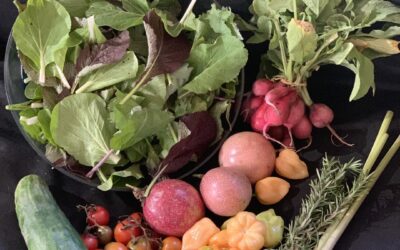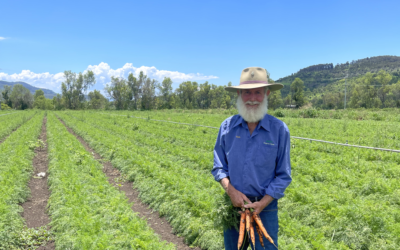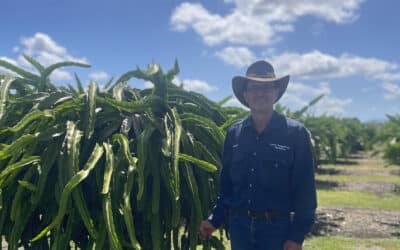The Country Kitchens team recently met with Michelle Chicken from Boyne River Pecans as part of the Meet a Farmer initiative. Michelle is a pecan and cattle farmer from Mundubbera, QLD. Michelle is also the Managing Director of Pecan Farmers’ Co-operative Australia.
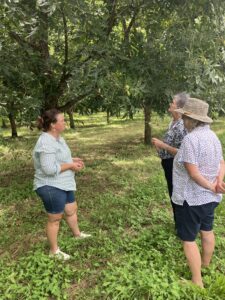
Upon meeting Michelle, she said “I’ve always known QCWA for their good food and the great hospitality that comes with it. I love the idea of Country Kitchens program and I would love to see it continue to be supported.”
Michelle and her parents are a fourth-generation farming family. Originally, Michelle’s parents owned the block beside the pecan farm where they farmed cattle. When the pecan farm came up for sale, they thought it was a good opportunity to gain more grazing country for their cattle. Michelle acknowledged that after purchasing the property, they were going to remove the pecan trees.
“Once we saw how much work had already been put into the (pecan) farm, we changed our minds and took it as an opportunity to diversify.”
Michelle explained that they learned that the Mundubbera climate and environmental conditions were well suited to growing pecans. “We are very involved in the industry, and we think it is well suited to Australia. They (pecans) like a hot dry climate and a short cold winter, which the Mundubbera area can really provide.”
“Pecan trees are water demanding over summer but quite efficient because they are a deciduous tree. We stop irrigating in April and don’t start again until September.”
Michelle added “We are also free of any pests and diseases here, so it was easy for us to transition to an organic system.”
When asked what she loves about being a pecan farmer she said, “There is a real satisfaction that comes from growing good food and having a relationship with the people that eat it.”
Michelle described the process of growing and harvesting pecans “It takes 10 years to yield a commercially viable crop from a pecan tree once it is planted”.
Harvest for pecans usually starts around Anzac Day. It is a mechanical harvest. Once the husks on the trees are opened, the trees are mechanically shaken for as little as three seconds so that the pecans fall to the ground.
A sweeping machine, similar to a road sweeper, is used to sweep them into a single row and the harvest machine picks them up.
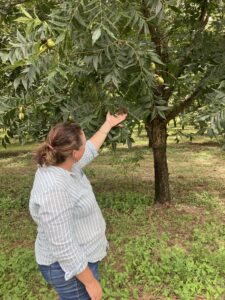
Once in the packing sheds, the pecans will go through the trommels. Any sticks, foreign objects, cracked and bird damaged nuts are removed as they move across the sorting table. They are sized by an inshell sizer machine and then processed into one tonne bulker bags. Finally, they are stored in a shipping container with a large dehumidifier and industrial fan that brings them down to the moisture level required before they are put into cold storage and eventually sold.
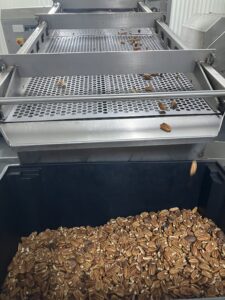
The pecans are mechanically shelled by a machine to prepare them for sale. Any broken nuts are sold to companies to be used in muesli, bars, and granola. She adds “they love this because it cuts down on labour costs to not have to chop them up.”
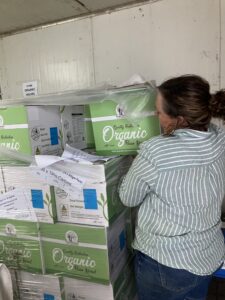
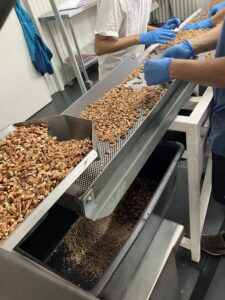
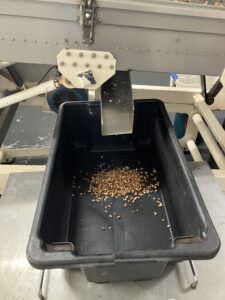
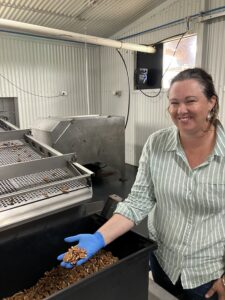
It was evident that Michelle tries to reduce waste in several ways. Even explaining that they are working on solutions to discard tree trimmings each year. “We tried getting a woodchipper last year to turn the branches into wood chip to put back on the trees, but it wasn’t cost effective. We have decided to pile them up and let them naturally degrade and put soil on top of them to create a compost pile this year. We use all the nut shells as compost as well” she added.
The whole, unshelled nut export is very popular in China as they are often boiled in brines and given as gifts.
Building relationships with small buyers that do home delivery of assorted fruit and vegetable boxes is also a focus for Michelle.
Michelle shared some insight into how the farm has changed over the years. Since starting, they have tripled the number of pecan trees, as well as invested in machinery with plans to invest further in the future. As such, labour requirements are low. Only two people are required for harvest and up to six in the packing shed.
They are also experimenting with pecan nut oil and testing it as a product to sell.
As part of the co-operative, Michelle is interested in a “Farmers Own” marketing campaign which will include a harvest trail. She hopes to open the farm gates to the public during harvest season in future. The goal is to increase their profile so that the public knows who they are and what they do.
Pecans are a great source of healthy unsaturated fat and fibre. They are also a source of antioxidants and Vitamin A which is important for eye health and immune function and contain folic acid which is needed for healthy growth, development, and function.
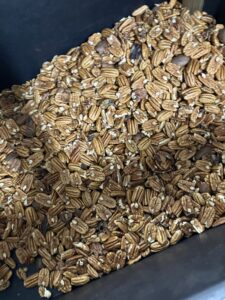
Pecans and other nuts are included in one of the five food groups in the Australian Guide to Healthy Eating, specifically the lean meat, poultry, fish, eggs, tofu, nuts and seeds and legumes/beans food group. To learn more about the Australian Guide to Healthy Eating go to https://www.eatforhealth.gov.au/.
If you would like to include a healthy pecan snack, try our Spicy Dried Apple and Pecan Trail mix recipe.
When it comes to cooking, Michelle said “We use pecans in everything. Any recipe that requires a nut or seed, we replace with pecans.”
To learn more about the QCWA Country Kitchens program, or the Meet a Farmer initiative, head to our website.
Empowering women through education and health is a priority for the Queensland Country Women’s Association (QCWA). The QCWA Country Kitchens program, funded by the Queensland Government through Health and Wellbeing Queensland, supports Queenslanders to adopt healthier lifestyles. To find out more about the program visit https://qcwacountrykitchens.com.au/.

